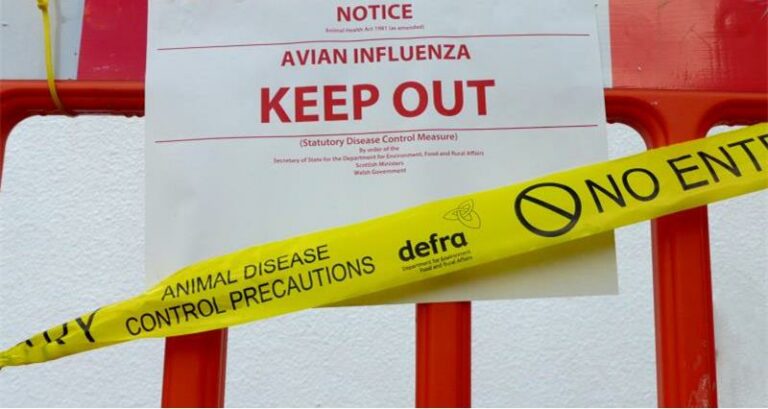A bird flu prevention zone has been declared across the whole of England, Chief Veterinary Officer Nigel Gibbens has confirmed today.
This means it is a legal requirement for all bird keepers to follow strict biosecurity measures. It comes as 13 dead wild birds were confirmed to have the virus in Warwickshire.
Last week 17 wild birds tested positive in Dorset and a total of 31 infected birds have now been identified at that site. Defra took swift action to put a local prevention zone in the area on Friday (12 January). However, as these latest results show the disease is not isolated to a single site the decision has been taken to extend the prevention zone across the country on a precautionary basis.
Testing of the birds found in Warwickshire is ongoing, however, it is highly expected that this will be the same H5N6 strain of the virus which has been circulating in wild birds across Europe in recent months. Public Health England have advised the risk to public health remains very low and the Food Standards Agency have said that bird flu does not pose a food safety risk for UK consumers.
Chief Veterinary Officer Nigel Gibbens said:
Following the latest finding of bird flu in wild birds in Warwickshire, we are extending our action to help prevent the virus spreading to poultry and other domestic birds.
Whether you keep just a few birds or thousands, you are now legally required to meet enhanced biosecurity requirements and this is in your interests to do, to protect your birds from this highly infectious virus.
Biosecurity measures
The prevention zone means bird keepers across the country must:
- Ensure the areas where birds are kept are unattractive to wild birds, for example by netting ponds, and by removing wild bird food sources;
- Feed and water your birds in enclosed areas to discourage wild birds;
- Minimise movement in and out of bird enclosures;
- Clean and disinfect footwear and keep areas where birds live clean and tidy;
- Reduce any existing contamination by cleansing and disinfecting concrete areas, and fencing off wet or boggy areas.
Keepers with more than 500 birds will also be required to take some extra biosecurity measures including restricting access to non-essential people, changing clothing and footwear before entering bird enclosures and cleaning and disinfecting vehicles.
The prevention zone will be in place until further notice and will be kept under regular review as part of our work to monitor the threat of bird flu.
Poultry keepers and members of the public should report dead wild birds to the Defra helpline on 03459 33 55 77 and keepers should report suspicion of disease to APHA on 03000 200 301. Keepers should familiarise themselves with our avian flu advice.
There are no plans to carry out any culls or put movement restrictions in place.
Background
- Trade should not be affected following the findings in wild birds, according to the rules of the World Animal Health Organisation (OIE).
- The risk to poultry and other captive birds depends, amongst other things, on the level of biosecurity on the premises and the likely contact between kept birds and wild birds, which is why it is now mandatory that all keepers ensure they practice the highest standards of biosecurity.
- Keep up to date with the latest avian influenza situation
- There are currently no findings of bird flu in Scotland, Wales or Northern Ireland and the prevention zone is for England only


